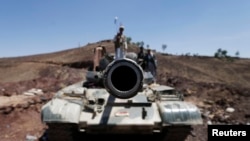Shi'ite rebels in Yemen celebrated with fireworks in the capital of Sana'a on Monday, 24 hours after signing a peace deal with the president to expand their political role.
Despite the agreement, the Houthis, also known as Ansarallah, spent the day raiding the homes of their opponents and establishing a hefty armed presence throughout the city in what one expert called a "half-coup."
Weeks of clashes in the capital left hundreds of people dead.
Editor-in-Chief of the Yemen Post newspaper, Hakim Almasmari, told VOA the Houthis controlled Sana'a and appeard to be dictating terms for the country's political future.
"It has calmed down, but the Houthis are now in control of almost every part of the government. Hundreds of Houthi gunmen are located on every corner of the capital Sana'a to ensure that their demands are met, and today is a new era in Yemeni politics, whether internally or in the country's foreign policy,” he said.
The death toll climbed past 200 on Monday as more victims of fighting in the capital, which intensified in the last week, were found after the U.N.-brokered truce.
Military forces did not resist the rebel takeover of government buildings like the Central Bank and state media on Sunday.
According to the government and media reports, by Monday, those facilities were being turned back over to military police.
Mohammed Albasha, a Yemen government spokesman in Washington, told VOA that when presented with the choice of a military conflict or a peace deal, President Abed Rabuh Mansour Hadi used restraint to avoid further bloodshed.
"The president held back… and did what he thought would be for the better good of the whole country," he said.
Yemen expert Charles Schmitz with the Middle East Institute described the Houthi presence in Sana'a and the ensuing peace deal as a “half coup.”
“It is confusing... you could read it that the rebels took the capital, overthrew the government - that’s certainly to some extent true," said Schmitz.
He believed the Shia rebel group wanted what it viewed as ineffective political and military leaders, primarily from the rival Islah party of Sunni Islamists, out of power.
A new prime minister will be named this week, and a new Cabinet will be appointed in the coming month.
In a disgruntled letter to the Yemeni people, Prime Minister Mohamed Basindwa resigned on Sunday, accusing Hadi of being "autocratic."
The new national unity government will include a Houthi adviser to the president, but the extent of the rebel group's role in the new Cabinet remains unclear.
(Edward Yeranian contributed to this report from Cairo.)




